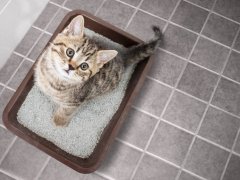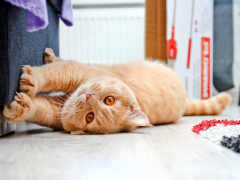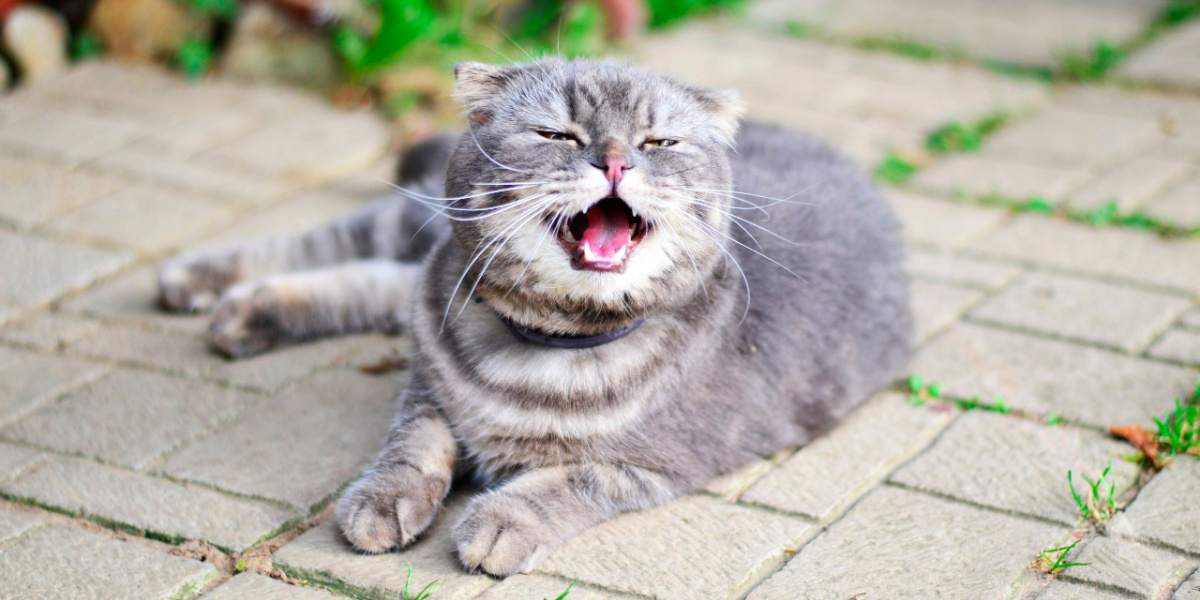
Shutterstock.com
Reverse sneezing is when nasal irritation causes cats to rapidly suck air in through their noses, making loud snorting sounds. It is also called inspiratory paroxysmal respiration. It’s the opposite of a regular sneeze where air is rapidly expelled out through the nose.
Reverse sneezing can be quite alarming but these episodes are usually harmless. Occasional reverse sneezing is a normal part of your cat’s airway defenses. However, if your cat starts to reverse sneeze out of the blue or it is becoming more frequent, it is a good idea to get them checked by your veterinarian.
What Does Reverse Sneezing Look Like?
Cats usually stand completely still during a reverse sneezing episode, with their head and neck extended forward. The abdominal muscles and diaphragm spasm, causing them to take rhythmic and rapid breaths in through their noses. This produces a loud snorting or honking sound that can be quite alarming.
Episodes of reverse sneezing typically last a few seconds to about a minute, with the cat behaving normally before and afterward. If you aren’t sure if your cat is reverse sneezing, it is helpful to record any strange sounds or behaviors to show to your vet.
Possible Causes of Reverse Sneezing
Reverse sneezing can be triggered by any irritation to the nose, sinuses, or back of the throat. It is even more likely if your cat has allergies or is a flat-faced breed, as their airways will be more prone to irritation. While reverse sneezing is usually harmless, it can occasionally be a sign of an underlying issue. Read on to understand why your cat might be reverse sneezing.
Irritants in the Air
Inhaling something that irritates the airways is the most common cause of reverse sneezing. Some common irritants your cat might encounter at home include:
- Smoke
- Dust
- Aerosols
- Air fresheners
- Scented candles
- Household chemicals
Limiting irritants in the air around your cat can help to reduce or prevent reverse sneezing—especially for cats with sensitive airways.
Allergies
While irritants in the air can be a trigger for any cat, cats with allergies are even more sensitive—particularly when it comes to common allergens like pollen or dust. Cats with allergies might show other signs, such as coughing, sneezing, wheezing, or itchy skin.
Excitement
Overexcitement is a common cause of sneezing and reverse sneezing. So if you notice your cat tends to reverse sneeze when they are playing or when you give them their dinner, it might be because they are excited.
Brachycephalic Breeds
Cats with short noses (such as Persians or British shorthairs) often have other abnormalities in their upper airways, including narrow nostrils and a long soft palette. This combination of abnormalities is called brachycephalic airway syndrome and can cause noisy breathing and other respiratory issues.
Brachycephalic cats are also more prone to episodes of reverse sneezing. This is probably due to their long soft palate that gets in the way of their windpipe and their tendency to produce a lot of mucus in their airways.
Health Conditions
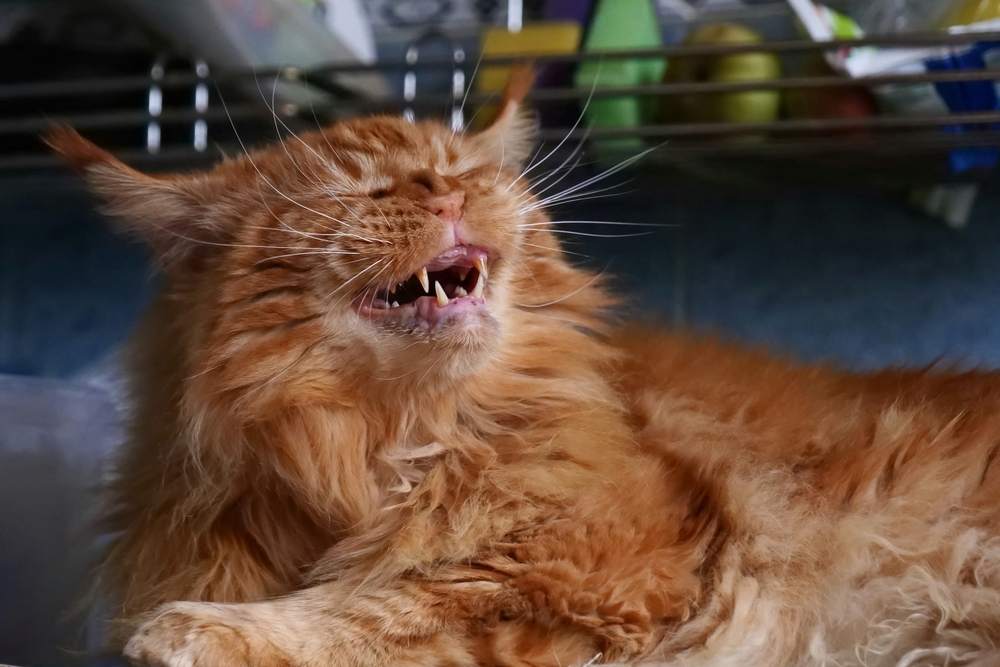
Shutterstock.com
More often than not, reverse sneezing is a harmless reaction to something irritating the back of your cat’s throat. But it can be a sign of a health problem, particularly if it starts suddenly and is very frequent. Health conditions that can cause reverse sneezing are the same as those that cause normal sneezing, including:
- Upper respiratory infections caused by bacteria or viruses
- Inhaled foreign bodies, such as grass
- Nasal polyps
- Dental disease
- Nasal tumors (Rare)
If reverse sneezing is related to a health condition, your cat will usually have other symptoms. Some examples include nasal discharge and changes in breathing, coughing, or sneezing. If your cat is showing signs of being unwell, get them checked by your vet.
When to Call the Vet
If your cat has occasional episodes of reverse sneezing, has no other symptoms, and seems well before and after, they probably do not need veterinary attention. If the episodes start out of the blue, are more frequent or severe, or other symptoms are developing, contact your vet.
Of course, it can be difficult to tell for sure if your cat is reverse sneezing. Record the episodes to show your veterinarian so they can confirm what’s going on or recommend further tests. They may recommend blood tests, x-rays, or even rhinoscopy (a camera up your cat’s nose).
Most importantly, an episode of reverse sneezing can look similar to serious conditions such as choking or breathing problems, which require immediate veterinary attention.
Signs of a breathing emergency include:
- Coughing
- Lips or gums appear blue
- Drooling
- An open mouth with no noise
- Distress
- Pawing at the mouth
- Staggering
- Collapse
If your cat is having difficulty breathing, take them to your closest veterinarian immediately. It is much better to get there and discover it is something harmless (like reverse sneezing) than to risk your cat’s life.
Also Read: Heavy Breathing in Cats
Treating Reverse Sneezing
Episodes of reverse sneezing are usually short-lived and don’t require any treatment. The best thing you can do for your cat is to stay calm and reassure them. Gently massaging their throat can help, but if not, blowing a few puffs of air on their nose will sometimes help break the cycle of reverse sneezes.
However, if your cat is suffering from reverse sneezing due to an underlying condition like allergies, your vet may recommend some treatment. This might include medications such as antihistamines, anti-inflammatories, antibiotics, or decongestants. You should only try medication on the advice of your veterinarian.
Prevention of Reverse Sneezing
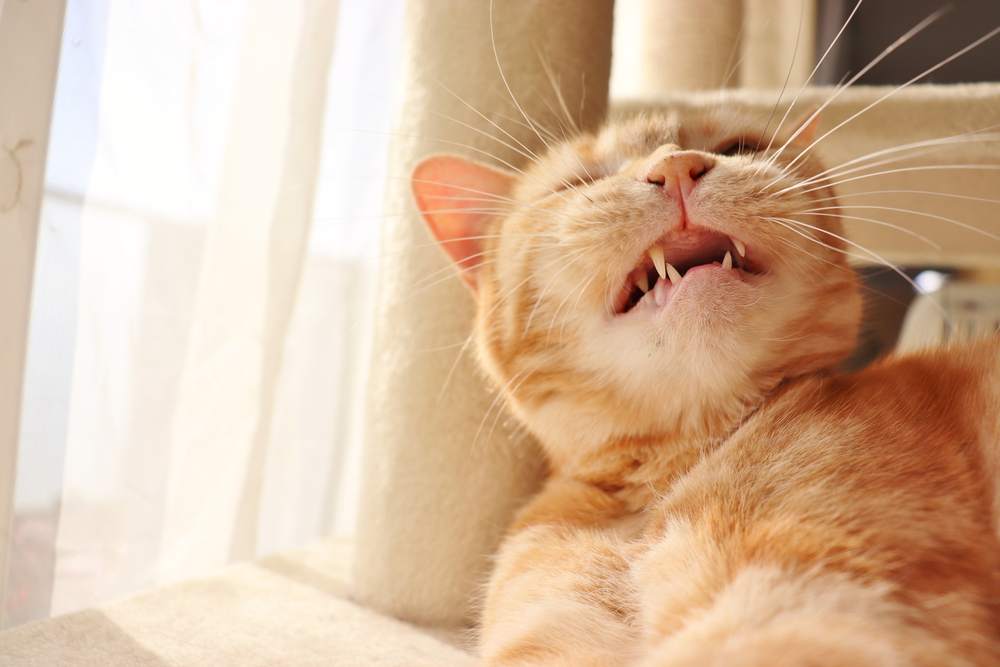
Shutterstock.com
As most episodes of reverse sneezing are triggered by some kind of inhaled irritant, the best way to prevent reverse sneezing is to reduce irritants in the air.
Some easy ways to reduce irritation to your cat’s airways are:
- Vacuum regularly
- Use dehumidifiers
- Avoid smoking indoors
- Keep windows closed during allergy seasons
- Avoid cleaning products with strong smells, aerosols, scented candles, etc.
- Use dust-free cat litter
Also Read: Are Humidifiers Safe for Cats?
Frequently Asked Questions
Is reverse sneezing in cats normal?
Occasional bouts of reverse sneezing are normal in cats and are actually part of their normal airway defenses. However, if they start reverse sneezing very frequently, or have any other symptoms, you should take them to be checked over by your veterinarian.
What causes reverse sneezing in cats?
Reverse sneezing is usually triggered by some sort of irritation in the nasal cavity or back of the throat. Common irritants in the air include dust, pollen, aerosols, and household chemicals. Most of the time reverse sneezing is harmless, but it can also occur as a result of health conditions such as nasal polyps or tumors.
How do you treat reverse sneezing in cats?
Most cases of reverse sneezing resolve on their own and do not require any treatment. If your cat is prone to reverse sneezing it can help to reduce any irritants in the air, for example not using aerosols or household chemicals around them. Sometimes reverse sneezing can be a symptom of a health condition that needs specific treatment by your veterinarian, such as a bacterial infection.
When should I worry about reverse sneezing?
If your cat has occasional bouts of reverse sneezing that clear on their own, and they have no other symptoms, then it is probably a normal behavior. But if they suddenly begin reverse sneezing out of the blue, very frequently, or they have other symptoms, you should get them checked by your veterinarian.



